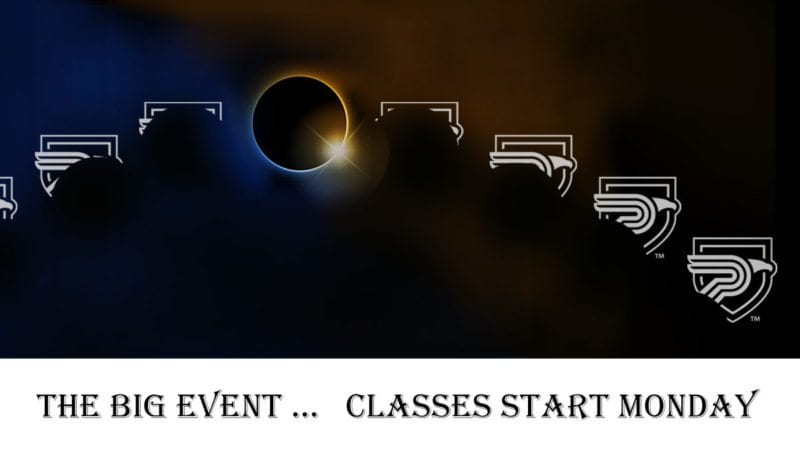Be Prepared for Two Major Events on Monday, August 21

Monday, August 21 is a big day for Polk State College! The fall semester is starting, with students bustling to prepare for their first day of classes. But, there is another big event taking place on August 21: a total solar eclipse!
The Great American Total Solar Eclipse will stretch from Oregon to South Carolina, dimming the skies from 1:15 pm through 4:30 pm. Those along the designated path can witness this rare phenomenon. The last event of this kind in the United States occurred Feb. 26, 1979, when the path of the eclipse passed through Washington, Oregon, Idaho, Montana, North Dakota, and the Canadian provinces of Saskatchewan, Manitoba, Ontario, and Quebec. Although Florida does not fall into the path of the total eclipse of 2017, a partial eclipse will still be visible.
Like many other individuals across the nation, students at Polk State are eager to experience this rare event.
“I am very excited to watch the eclipse on Monday,” said Erin Whitworth. “My family and I will be traveling to Orlando to watch, and we have our approved glasses ready to go. I have always had an interest in astronomy, so this event is really special.”
For Balil Paden, he’s been way too busy getting ready for school to even know the event was happening.
“When is it?” he asked. “I have been so focused on getting ready for classes and basketball tryouts on Monday night, that I didn’t even realize there was something going on! I will definitely try to watch.”
David White, Jr. plans to watch as much as he can – if he can remember with all that is happening. “I definitely want to attempt to watch it this year.”
Whether a person is starting classes at Polk State on Monday, watching the solar eclipse–or doing both– it’s important to be prepared. Here are a few preparedness tips for both of these important events:
| Solar Eclipse | Polk State Fall Semester |
|---|---|
| Individuals should only view the eclipse through safety glasses that comply with international safety standards for direct viewing. Sunglasses are not an acceptable substitute. Viewers should be sure to purchase products from reputable vendors. The American Astronomical Society provides a list of reputable manufacturers and dealers. | Each student should print a copy of his or her schedule to carry on campus during the first day of class. There are copies of maps and informative staff members at the First Days Tables in centralized locations across campus. |
| A person should avoid viewing the eclipse at 2:50 pm. The eclipse will be at its peak and will have the most potential to permanently damage eyesight. | Each student should arrive early to allow time to park and find the classroom. |
| A person should not look at the eclipse through an unfiltered camera, telescope, binoculars, or other optical device. Even while using eclipse glasses, the concentrated solar rays damage the filter and enter the eyes, causing serious injury. | Students should come prepared with the right tools including notebooks, pens, highlighters, pencils, and all course textbooks. |
| If an individual normally wears eyeglasses, these should be kept on when participating in the event. Eclipse glasses can be placed over glasses, or a hand-held viewer can be placed in front of them. | Success requires participating and being fully engaged in class. |
| More tips for safe viewing of the eclipse can be found on NASA’s website at eclipse2017.nasa.gov. | If things get hectic or confusing, it is okay to use resources and ask for help. To avoid frustration, students can stop at the First Days Tables or visit the Academic Advising Office for direction and assistance. |
It will be a big day across the United States, but this landmark event makes for an even more memorable beginning for this year’s Polk State Eagles.

